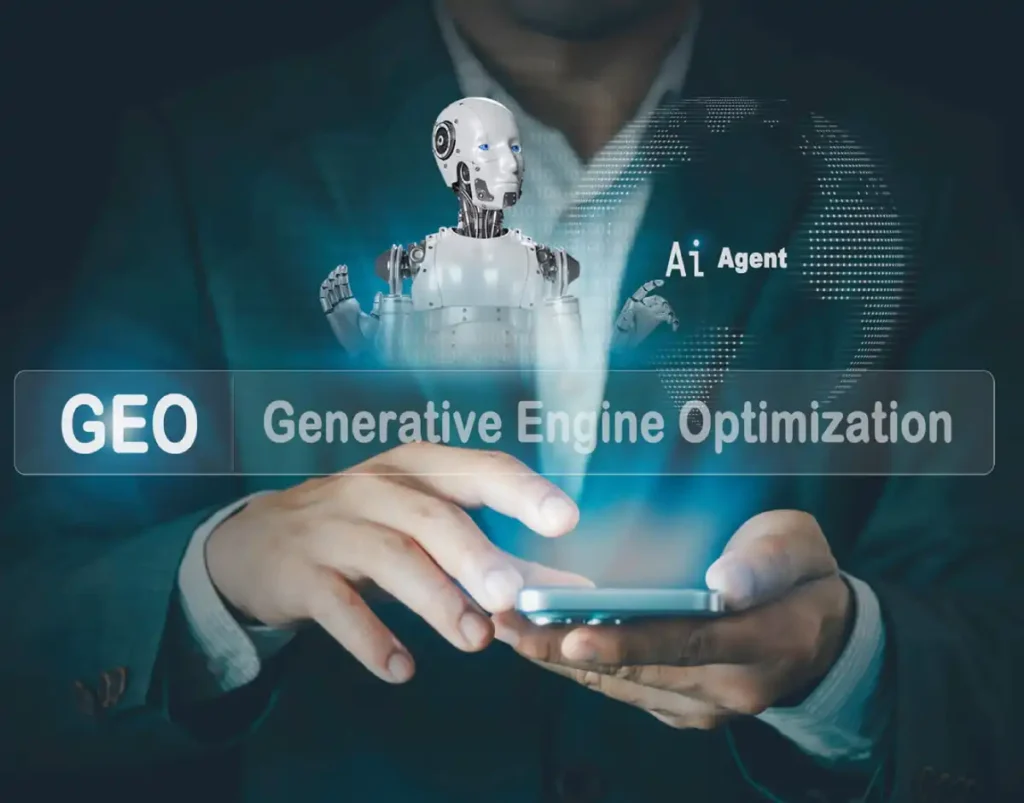Generative Engine Optimization (GEO) is the new frontier for anyone who wants to be found online. The way people find information is fundamentally changing. We are moving beyond the traditional list of blue links to a world where AI models provide direct, synthesized answers. This shift means that optimizing your content for AI-driven platforms is no longer optional. It is the core of your digital strategy.
I’m here to tell you how to adapt. I’ll show you the crucial differences between old and new strategies. I’ll also share exactly what the top performers are doing right. Finally, I will provide a new perspective on the most difficult parts of this transition, giving you a clear path forward.
The New Rules: GEO vs. Traditional SEO

A new study by the Pew Research Center reveals that when Google’s AI-generated summaries—or “AI Overviews”—appear in search results, users are significantly less likely to click on traditional links. The report found that users clicked on links in only 8% of visits when an AI summary was present, compared to 15% of visits without a summary. Clicks on the links cited within the AI summary were even rarer, at just 1%.
The study also noted that users were more likely to end their browsing session after seeing a page with an AI summary. These summaries were more likely to be generated for complex queries, such as questions or searches with 10 or more words, while appearing rarely for one- or two-word searches. The most common sources cited in both AI summaries and traditional results were Wikipedia, YouTube, and Reddit, with government websites (.gov) being cited more frequently in the AI overviews.
For years, Search Engine Optimization (SEO) was about getting a top ranking on a search results page. We focused on keywords, backlinks, and technical elements. The goal was to outrank our competitors to get a click. Generative Engine Optimization (GEO) operates with a completely different objective.
Building authority is the core of any successful Generative Engine Optimization strategy, and a strong backlink profile remains a powerful signal of credibility. This is especially true for local businesses, where links from community organizations, local news outlets, and other trusted businesses can establish you as a local expert. To learn how to build these essential connections, explore my detailed guide on Link Building For Local SEO: 8 Ways to Rank Higher in Google SERP.
GEO’s main objective is to be the most trusted, authoritative source that an AI selects to answer a user’s query.
Based on a Search Engine Land article, AI-driven traffic to websites has skyrocketed by 527% in the first five months of 2025, according to a Previsible AI report. This surge, primarily driven by platforms like ChatGPT and Perplexity, is transforming the SEO landscape. Instead of just aiming for a top ranking on a search results page, the new strategy is about getting your content selected and cited by AI models. This requires marketers to track traffic from AI platforms and optimize content to be easily extracted by AI, using clear formats like bullet points and FAQs. This shift from ranking to being selected as a trusted source marks a new era in search engine optimization.
The metrics we track have also changed. Traditional SEO measures organic traffic and keyword positions. A GEO strategy looks at different signals. We monitor how often an AI cites our content. We want to know if our brand appears in AI-generated summaries. We care about our “share of voice” in these new, curated responses.
The tactics for GEO are also different. They build on the best parts of SEO but focus on different priorities. While SEO may have focused on keyword density, GEO focuses on content structure. It emphasizes clear, concise writing. Most importantly, GEO puts a premium on content that demonstrates real-world expertise and trustworthiness.
The Pillars of a Winning Generative Engine Optimization Strategy

Winning at GEO means building a strategy on a few key principles. These are the cornerstones of getting your content noticed by AI models.
Mastering E-E-A-T: More Than a Buzzword
You have likely heard of E-E-A-T, which stands for Experience, Expertise, Authoritativeness, and Trustworthiness. It’s no longer just a guideline. It’s the primary signal AI uses to find credible information.
Gravital Agency emphasizes Google’s E-E-A-T framework (Experience, Expertise, Authoritativeness, and Trustworthiness) as crucial for SEO success in 2025. While not a direct ranking factor, it’s used by human raters to assess content quality and inform algorithm updates. Trustworthiness is the most vital component, as it serves as the foundation for the other elements. To improve E-E-A-T, the article recommends strategies such as thorough fact-checking, providing transparency with a detailed “About Us” page, and securing the website with HTTPS encryption. This framework is particularly important for “Your Money or Your Life” (YMYL) topics, such as health and finance, where content accuracy and credibility are paramount.
Showing E-E-A-T means providing more than surface-level information. You need to show real, verifiable experience. This could mean sharing a detailed case study with data from a recent project. You could also include unique insights only a professional in the field would have. Citing the credentials of your content creators is essential. Use structured data to link to the author’s professional profiles. Building authority comes from linking to and being linked by other trusted sources. Trust is the foundation of it all. Be transparent with your sources. Keep your content up-to-date and accurate.
Structuring Your Content for AI Readability
AI models are highly efficient at processing information. They love content that is organized and easy to scan. You must think like a machine when you write.
Here are some ways to structure your content for AI:
- Use Clear Headings: Use
H1for your title, and then follow a logicalH2,H3structure. - Employ Lists and Tables: AIs love bulleted and numbered lists. These formats make it simple to extract key information.
- Provide Concise Summaries: Start your article with a summary of the main points. End with a “key takeaways” section.
- Answer the Question Directly: Address the user’s query in the very first paragraph. Get straight to the point.
Using Structured Data and Schema Markup
Schema markup is a language that helps search engines understand your content. Think of it as a set of labels you can add to your website. It helps AIs categorize and interpret your information. This is especially useful for GEO. You can use schema types like FAQPage, HowTo, and Article to signal your content is high-quality. This increases the chances of being featured in rich results.
Moving Beyond the Basics: Advanced Strategies and Real-World Examples

Most articles cover the basics of GEO. They tell you what to do. But they often miss the most interesting part: what happens when you do it? How do you measure success? What happens when you go beyond Google? I’ve looked at these questions and found some fascinating answers.
Real-World Success Stories
Many people ask for proof. They want to see how a Generative Engine Optimization strategy works in practice. We are starting to see some great examples.
- A Hypothetical Case Study: A small e-commerce brand focused on sustainable home goods decided to re-optimize its content for GEO. They had a blog post on “the best non-toxic cleaning products.”
- Before: The article was a simple list with affiliate links. It got decent traffic but wasn’t seen as an authority.
- After: The brand updated the article. They added a video showing the products in use (demonstrating experience). They cited two environmental experts (establishing expertise). They created a clear comparison table of ingredients. This structured data made it easy for AIs to understand.
- The Result: The article didn’t just rank higher in search. It was also cited multiple times in Google’s AI Overview when users asked for “non-toxic cleaning tips.” This increased branded searches for the company by 25% in three months. Their products were being recommended in AI-generated responses, which led to a 15% increase in direct sales.
A key part of Generative Engine Optimization is building authority, and a great way to do that is by demonstrating your expertise across a range of topics. For small business owners, this means creating a strong foundation with a focused digital strategy. To learn more about getting started, check out my article on SEO for small business to boost your online visibility.
Optimizing for More Than One Platform
Many GEO discussions focus only on Google’s AI Overviews. But the AI landscape is diverse. Platforms like Perplexity.ai, ChatGPT, and Copilot have their ways of sourcing and citing content.
- Perplexity.ai: This platform prioritizes multiple credible sources. To win here, you need a strong link profile and well-cited information. It’s not enough to be a single source of truth. You must be part of a network of trusted sources.
- ChatGPT and Gemini: These models are different. They often use your content as a knowledge base to generate their responses. Your goal here is to provide comprehensive, well-structured information. Think of it as writing a textbook entry. The more detailed and clear your content, the more likely the AI will use it as a foundational source.
A Better Way to Measure Your Performance
How do you know if your GEO efforts are working? We need to go beyond old-school metrics.
- Tracking AI Citations: Tools are emerging that can track when and where AI platforms cite your content. A simple but effective method is to set up a brand monitoring system. It should alert you whenever your brand is mentioned in an AI-generated summary.
- Monitoring Branded Searches: A rise in branded searches is a strong signal that your GEO strategy is working. When an AI cites your content, users often search for your brand name directly afterward. You can track this in Google Analytics and Google Search Console.
- Self-Reported Attribution: The simplest and most direct method is often the best. Ask your customers. Add a “How did you hear about us?” field to your contact or checkout forms. Include “AI search” or “AI overview” as an option. This provides a direct link between your GEO efforts and real business results.
The Influence of Unowned Media
What if I told you your online community and your reputation on other sites could directly affect your GEO success? It’s true. AIs scan a wide range of content. This includes forums, social media, and third-party reviews.
- Example: A niche tech company had a small but dedicated following on Reddit. Their community often discussed and recommended their products. When a user asked an AI a question about a product in that category, the AI often found and summarized these conversations. The AI then cited the company’s website as a source of authority. This happened because the company’s brand was consistently mentioned in a trusted, conversational context on a different platform.
This is a powerful lesson. AIs are looking for signals of trust and community. Your presence on platforms you don’t own can significantly influence your chances of being cited.
Conclusion: The Future of Search is Here
The way we find information has changed. The search result page is no longer the final destination. It is a new beginning. Generative Engine Optimization is your map for this new world.
It starts with a simple idea: be the most trusted voice in your industry. Create content that is so good, so authoritative, and so well-structured that an AI has no choice but to cite you. By focusing on quality, demonstrating your real experience, and understanding the new rules of the game, you can ensure your brand remains visible and relevant. Start building your GEO strategy today. Your brand’s future depends on it.
FAQ about Generative Engine Optimization
Q: Will GEO replace traditional SEO? A: No, not at all. GEO is the next evolution of SEO. A strong GEO strategy is built on a foundation of good SEO practices. You still need a fast website. You still need a good user experience. You just have new, more powerful tools to consider now.
Q: Is it safe to use AI to write my content? A: It’s best to use AI as a tool, not a replacement for human writers. Use it for research, outlines, or editing. You should always use your own expertise, voice, and unique insights. AI-generated content can be generic. Human-created content is what AI ultimately cites.
Q: How quickly will I see results from GEO? A: This depends on many factors. You may see an increase in brand mentions and citations within a few months. Increased traffic and sales could take longer. The key is consistent effort and a focus on long-term strategy.




